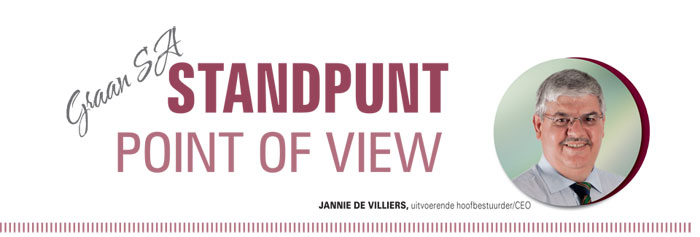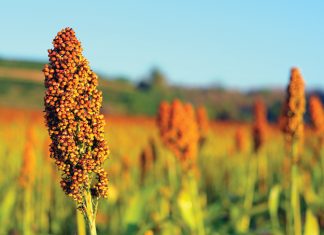October 2016

JANNIE DE VILLIERS, uitvoerende hoofbestuurder/CEO
The 2015/2016 season now properly resembles a five-day cricket test. It is the last session of the fifth day with two more wickets in hand – and we are batting for a draw. It is heading for an end where nobody wins. It was a long, tough battle distinguished by a lot of sweat.
We have learned many lessons, but it is not a season we would wish to remember. There will be a lot of talking about it, but the remembering will be forced. Like our maize crops in the western part of the country, the many hours which we as organised agriculture had spent to prepare drought plans and to calculate the damage yielded nothing.
Everybody listened and participated in the talking, but no action followed the words. The only beacon of hope were the actions launched by the private sector via Agri SA. We owe all the donors and participants a big thank you! The tears of producers who received much-needed outcome this way, confirmed their great appreciation.
Fortunately, there is a new season ahead. While writing this article, good rains fell in the Western Cape and their crops look very promising. This is possibly just the wonderful precursor of what we, here in the northern parts of our country, might expect.
After the 2016 municipal elections there is a feeling of expectation for a new season throughout the country. The importance of a new season lies therein that it has more to do with doing than talking, and that there might be a lot happening that could distract your attention and focus. The manner in which you react and conclude matters must be a reflection of your character. Agriculture requires humility and that we become silent before the Creator who controls everything. Our destiny is in His hands.
One such a ‘new season’ that is trudging uphill slowly, is the position the Industry Chamber of Agri SA should fulfil. Already some of the industries have resigned from Agri SA due to the fact that we cannot attain unity in agriculture. This obliges some of the industries to affiliate with more than one national organisation, which costs additional money. The solutions for this thorny issue do not abound, but we will have to push on for the sake of a sector that is critical for the future of our country.
I recently read what has been written about Brexit and the similarity it has with the unexpected support Donald Trump receives in the USA. There are even similarities thereof with the outcome of our own municipal elections.
Agriculture will have to take notice of peoples’ anger about matters that threaten their own lives and living standards – which is expressed through the ballot box. In English it is referred to as ‘sea change’ – meaningful change or transformation. While we in agriculture are still struggling to reach consensus on what transformation is and how to do it correctly, a different type of transformation has occurred in our communities that has very little to do with race.
Agricultural leaders now run the risk that the same thing that has happened with their political colleagues could happen to them: To lose contact with what really matters at grassroots level. Rage and fear drive people to irrational decisions and inappropriate conduct.
Publication: October 2016
Section: Features

















